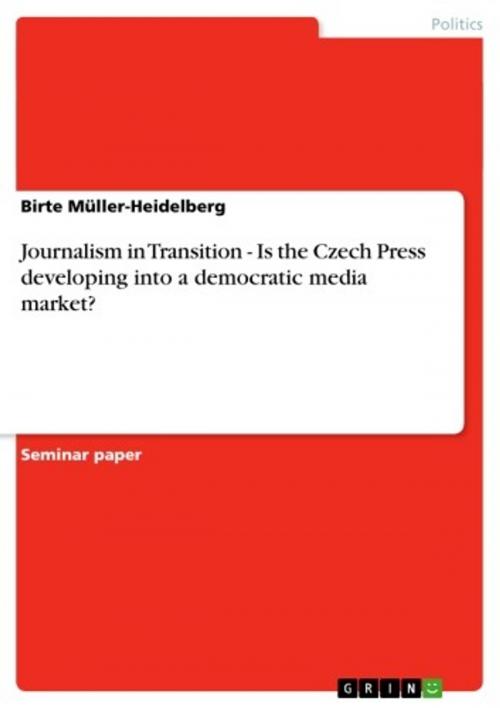Journalism in Transition - Is the Czech Press developing into a democratic media market?
Is the Czech Press developing into a democratic media market?
Nonfiction, Social & Cultural Studies, Political Science, International, International Relations| Author: | Birte Müller-Heidelberg | ISBN: | 9783638290791 |
| Publisher: | GRIN Publishing | Publication: | July 13, 2004 |
| Imprint: | GRIN Publishing | Language: | English |
| Author: | Birte Müller-Heidelberg |
| ISBN: | 9783638290791 |
| Publisher: | GRIN Publishing |
| Publication: | July 13, 2004 |
| Imprint: | GRIN Publishing |
| Language: | English |
Seminar paper from the year 2004 in the subject Politics - International Politics - Region: Eastern Europe, grade: B, Charles University in Prague (Sociology Faculty), language: English, abstract: When Freimut Duve, the Representative on Freedom of the Media of the Organization for Security and Co-operation in Europe (OSCE), quit his job in December of 2003 because his mandate ended after six years, he delivered his last regular report to the permanent council, saying: 'Six years ago there was great hope in the world for those countries that came from a very dramatic past where freedom for writers and journalists was non-existent. [...] Back in the nineties we all felt confident that we would be able to overcome the burden of the past in the structure of many media outlets in the newly emerging democracies. [...] We had not foreseen that in the following six years the situation would change not for the better.'1 Duve does not analyse the Eastern and Central European media as still being stuck in communism or repressed by their governments. What he does state though, is a lack of really free, investigative journalism in former communist countries. This essay will take a closer look at these accusations and discuss possible reasons for the existing problems. The different approaches to the media's function in communism and democracy will be explained (chapter 2), and transition difficulties from one system into the other will then be highlighted (3). Chapter 4 will go deeper into the events that took place in the Czech Republic after the Velvet Revolution in 1989. The conclusion will finally not only summarize the essay's findings but also look further into the future and try to give possible solutions for the occurring problems. 1 Duve, 2003, p.1
Seminar paper from the year 2004 in the subject Politics - International Politics - Region: Eastern Europe, grade: B, Charles University in Prague (Sociology Faculty), language: English, abstract: When Freimut Duve, the Representative on Freedom of the Media of the Organization for Security and Co-operation in Europe (OSCE), quit his job in December of 2003 because his mandate ended after six years, he delivered his last regular report to the permanent council, saying: 'Six years ago there was great hope in the world for those countries that came from a very dramatic past where freedom for writers and journalists was non-existent. [...] Back in the nineties we all felt confident that we would be able to overcome the burden of the past in the structure of many media outlets in the newly emerging democracies. [...] We had not foreseen that in the following six years the situation would change not for the better.'1 Duve does not analyse the Eastern and Central European media as still being stuck in communism or repressed by their governments. What he does state though, is a lack of really free, investigative journalism in former communist countries. This essay will take a closer look at these accusations and discuss possible reasons for the existing problems. The different approaches to the media's function in communism and democracy will be explained (chapter 2), and transition difficulties from one system into the other will then be highlighted (3). Chapter 4 will go deeper into the events that took place in the Czech Republic after the Velvet Revolution in 1989. The conclusion will finally not only summarize the essay's findings but also look further into the future and try to give possible solutions for the occurring problems. 1 Duve, 2003, p.1















